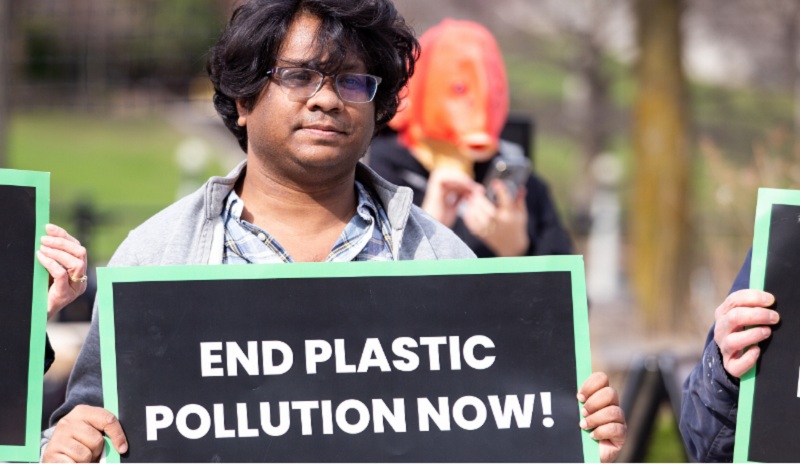By Sherley Hepsiba Dokiburra
India has opposed limits on the production of primary virgin plastic in the name of development and industrialisation.
It thus became a party to scuttling the proposed United Nations Global Plastics Treaty (INC 5.2) for which negotiations were held in Geneva from August 4-14, 2025.
These talks are part of a process set in motion by the 2022 United Nations Environment Assembly Resolution which gave negotiators the mandate to craft a legally binding treaty that addresses plastics across their entire lifecycle, from production through to disposal.
The latest draft placed before the countries in Geneva in the sixth round of negotiations proposed stronger measures for waste management, better recycling systems, and tightened controls on hazardous additives.
However, it did not include limits on the production of virgin plastics or tighter regulation of chemicals used in their production.
The inability of the 180 participating countries to agree on imposing limits on the production of new plastics emerged as the main stumbling block to reaching a consensus.
The disagreement hardened into a clear divide between two negotiating blocs.
The High Ambition Coalition (HAC), a group of around one hundred countries including the European Union, argued that production caps are essential to avert worsening ecological and public health risks.
Opposing them, the Like Minded Countries (LMC) — made up of petrochemical producers such as Saudi Arabia, Iran, Kuwait, Bahrain, China and Cuba — rejected restrictions on production.
India’s stance: The development argument and its limits
India sided with the LMC bloc voicing opposition to limits on plastic production.
India justified this stance by invoking developmental imperatives. Its position is that restricting primary or virgin plastic production would constrain economic growth and industrialisation, particularly in a country where millions still lack secure livelihoods and basic services.
This framing resonates with the long-standing Global South demand for “common but differentiated responsibilities” in environmental governance.
However, India’s opposition to limits on plastic production may turn out to be more damaging than beneficial.
India’s own record with development when viewed through the lens of environmental change reveals a history that is far more conflicted than celebratory. Decades of scholarship and activism have shown how the pursuit of growth in the country has often produced deeper dispossession rather than reducing poverty.
For example, large infrastructure projects have displaced communities on a massive scale, while the benefits of economic growth are captured by a narrow section of society. Marginalised groups are frequently left out of the gains from development, and the gap between the wealthy and the poor continues to widen.
Against this backdrop, India’s defence of plastics is a defence of accumulation that shifts ecological burdens onto the poor while reinforcing the very inequalities that development was supposed to undo.
Plastics may create short-term industrial profits, but they also worsen pollution, health burdens, and ecological crises that disproportionately harm the poor.
Plastic, petrochemicals, and neocolonial dependence
Adam Hanieh’s Petrochemical Empire highlights how plastics are inseparable from the global oil and petrochemical complex. Far from being a neutral material serving development, plastic production sustains a political economy that concentrates wealth and power in the hands of a few transnational corporations and petrostates.
In this sense, defending plastic production in the name of “development” entrenches dependency on fossil fuels and ties India’s trajectory to a reimagined neocolonial petrochemical regime.
The historical linkages between the plastics industry and colonialism show how patterns of extraction and exploitation are reconfigured through modern petrochemical expansion. The petrochemical regime is not only an economic system but also a continuation of colonial logics, where control over resources and production reinforces global hierarchies at the expense of ecological and social justice.
By presenting its opposition to production limits as a defence of the right to development, India risks legitimising continued petrochemical expansion while avoiding the harder questions of justice and equity.
Such a position sustains inequalities by concentrating the benefits of growth among powerful actors, while leaving marginalised groups outside both the gains of development and the protections of environmental governance.
This contradiction is evident in the country’s petrochemical growth. Industrial zones such as Dahej in Gujarat, Paradeep in Odisha and Kochi in Kerala have driven rapid increases in plastic and chemical output, but reports have also documented polluted waters, stressed ecosystems and declining fish catches in surrounding regions.
The burden falls most heavily on coastal and small-scale communities, while investors and export markets capture the benefits. Yet the problem is not confined to the coasts.
Rising plastic production shapes consumption patterns across the country, deepening waste and health challenges that sit uneasily with India’s own Lifestyle for Environment (LIFE) Mission, which calls for sustainable practices and responsible consumption.
Against this backdrop, resisting production limits at the global stage ties India’s diplomatic position to a development path that is increasingly difficult to defend on grounds of equity or environmental responsibility.
Environmental justice dimension
Environmental degradation caused by plastics is staggering. Microplastics infiltrate soil, water, and even human bloodstreams. Marine ecosystems are suffocating under the weight of plastic debris.
Communities living near landfills and incineration sites, often poor, Dalit, or Adivasi, bear disproportionate health costs. To oppose production caps while conceding only to waste management provisions, as India currently does, is to address symptoms while ignoring causes.
Research on the decolonisation of environmentalism offers a useful lens here. Environmental justice requires confronting global power asymmetries and ensuring that ecological protection does not reproduce colonial hierarchies.
India could have articulated a genuinely decolonial stance by demanding that the Global North curb its overconsumption while supporting just transitions in the South. Instead, by aligning with petrochemical exporters, India risks reinforcing neocolonial dependencies while sacrificing vulnerable communities at home.
Trade risks and the Global South’s vulnerability
Opposing limits on plastic production carries significant trade risks for India and other countries in the Global South. By siding with petrochemical exporters and resisting production caps, these economies may secure short-term industrial gains, but they expose themselves to punitive trade measures from major markets such as the European Union and the United States, where environmental compliance is increasingly tied to market access.
Just as carbon border adjustments are reshaping trade in steel and cement, similar mechanisms could emerge for plastic-intensive goods, placing exporters from the South at a disadvantage.
In this scenario, the very strategy framed as defending the right to development could leave countries vulnerable to economic isolation while the environmental burdens of unchecked plastic production continue to fall disproportionately on their own populations.
Towards a just position
The stalemate at Geneva is a symptom of deeper global rifts.
Plastics are not merely a technical issue but a window into the contradictions of contemporary capitalism, development, and environmentalism.
India faces a choice. It could continue to weaken the treaty by defending petrochemical interests under the guise of development.
Or, it could reclaim a genuinely decolonial and justice-oriented stance: demanding ambitious production cuts from the Global North, while pursuing equitable transitions at home that prioritise the well-being of the poor and the sustainability of ecosystems.
To insist that “development” requires endless plastic is not only ecologically unsound but also historically dishonest. A just future would mean confronting petrochemical dependency, rejecting neocolonial logics, and embracing pathways that strengthen rather than weaken global environmental governance.
Sherley Hepsiba Dokiburra is a PhD scholar at National Law School of India University, Bengaluru and teaches law at the Damodaram Sanjivayya National Law University, Visakhapatnam.
Originally published under Creative Commons by 360info™.















